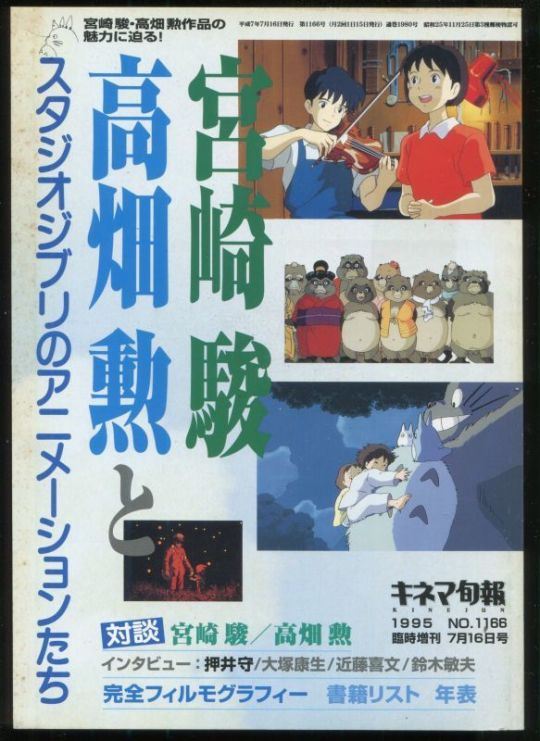#高畑・勲
Text
Bulgarian Music in Studio Ghibli films
”Myth has it that Orpheus was born in what is now Bulgaria. It seemed to be fact, not myth, that his daughters are still singing there”
These words were written by the New York Times in the remote 1963 — the year in which the largest Bulgarian folk ensemble crossed the Iron Curtain to conquer an entire continent with its cosmic art.
The 1975 release of Le Mystère des Voix Bulgares, a compilation album of modern arrangements of Bulgarian folk songs, further popularized Bulgarian music, and in 1977, a vinyl record featuring the folk song “Izlel ye Delyo Haydutin” (Eng: Come out rebel Delyo) began its journey aboard the Voyager 1 and Voyager 2 spacecrafts.
From this point on popularity from the West spread to the East, and Bulgarian folk music made it to the entertainment industry, including legendary Japanese anime films, like the cult cyberpunk “Ghost in the Shell” or the heartwarming Studio Ghibli features.
In this short article I write about two occasions of Bulgarian music playing in Studio Ghibli’s films.
The record that inspired the creation of “Only Yesterday”
“Only Yesterday” is a 1991 Japanese animated drama film written and directed by Isao Takahata, based on the 1982 manga of the same title by Hotaru Okamoto and Yuko Tone. Set in rural Japan, the film draws parallels with the peasant lifestyle present in Eastern Europe.
The original work is a compilation of short stories about 11-year-old Taeko’s daily life in 1966. Director Takahata had a hard time making it into a movie since the manga, told in the form of a memoir, has no plot to hold a feature. Together with producer Toshio Suzuki, they came up with the solution of bringing the narrator of the story, adult Taeko, into the movie. But there is a curious anecdote about how this idea came to mind.
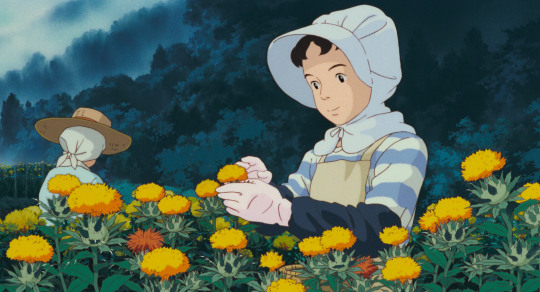
Taeko picks safflower as the Bulgarian song “Malka moma dvori mete” plays in the background. © Studio Ghibli
In a 2021 interview with students from Sofia University St. Kliment Ohridski, producer Suzuki recounts how a record of Bulgarian songs performed by the children choir “Bodra Smyana”, introduced to him by director Takahata, inspired the creation of the movie. Moved by the cosmic voices of the children, they decided to make “Only Yesterday” a musical. He also recalls what a tiring process it was to acquire the rights to the music, but if you’ve seen the movie, I am sure you will agree that it was worth it; the haunting, beautiful songs with the pastoral images of farmers picking flowers contribute to one of the greatest scenes created in cinema.
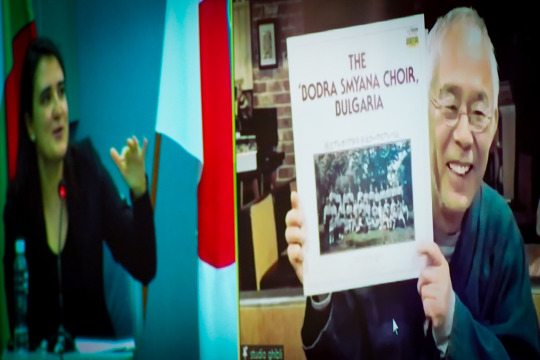
Producer Suzuki showing the record that inspired the creation of ”Only Yesterday”. Source: Studio Ghibli’s Twitter
In “Only Yesterday”, we can hear two songs from the album Bulgarian Polyphony I by Philip Koutev Ensemble. The upbeat “Dilmano Dilbero” [Eng. beautiful Dilmana] sets a happy mood as the protagonist gets changed and ready to go on the field. As the scene shifts and Taeko starts narrating a sad story about the girls in the past picking safflower with their bare hands, the song and mood shift as well.
While the first song has a fast rhythm, with lyrics about pepper planting that can also be interpreted figuratively, the second one, “Malka Moma Dvori Mete” [Eng., a little girl sweeps the yard], is a ballad about a young girl who is forced into marriage but has never known true love.
Both compositions sing about life-cycle events like marriage and the regular coming of the harvests, with lyrics perfectly fitting the setting and plot of the movie, which makes me wonder if the filmmakers chose them by chance or if they had someone translate the words.
Bulgarian Cosmic Voices Enchanting Howl
“Howl’s Moving Castle” is a 2004 Japanese animated fantasy film written and directed by Hayao Miyazaki, loosely based on the 1986 novel of the same name by British author Diana Wynne Jones. Set in a fictional kingdom the movie draws inspiration from various places in Europe. One of them being Bulgaria.
The story focuses on a young girl, named Sophie, magically transformed into an old woman, and a self-confident but emotionally unstable young wizard, Howl, living in a magical moving castle.
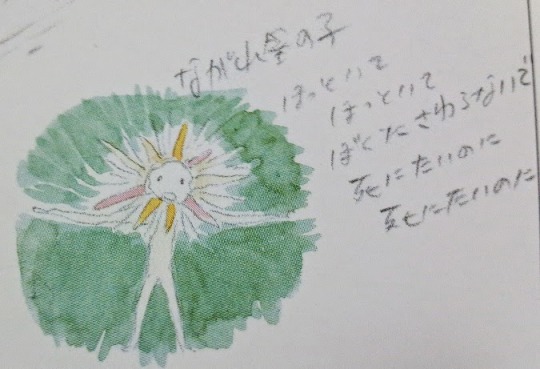
A sketch of a Star Child. Source: The Art of Howl’s Moving Castle
If you’ve seen the movie, you surely remember the scene when Madame Suliman ambushes Howl and tries to strip him of his magic powers. Star Children encircle him and his companions; their shadows grow big, dark and intimidating. They start dancing and chanting unintelligible magic words and are almost successful in their devilish act.
This scene, together with the music played in the background, have been a favourite of many fans of the film. Some even recount it giving them nightmares when they were children.
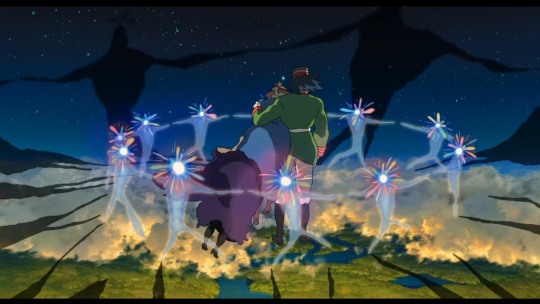
Star Children encircle Howl in an attempt to strip him of his magic powers. © Studio Ghibli
It turns out, however, that these aren’t any incantations, but the lyrics of a folk song. In Bulgarian. And a love song! Contrary to popular belief, the lyrics have nothing to do with magic and are actually about a boy taking his sweetheart, Dona, to the market to buy her new clothes. The excerpt used in the movie is very short and a bit altered from the original, but the words used go like this: Trendafilcheto, kalafercheto, Done mamino, translated as “the rose, the costmary, my darling Dona”.
I am planing a follow up article where I will post the translated lyrics together with a brief explanation on how they are related to the movies.
If you want to comment on or add something, I would love to hear!
Source
#studio ghibli#only yesterday#howls moving castle#Le Mystère des Voix Bulgares#bulgarian folklore#bulgaria#toshio suzuki#hayao miyazaki#isao takahata#bulgarian music in ghibli films#the boy and the heron#スタジオジブリ#ブルガリア#おもひでぽろぽろ#ハウルの動く城#宮崎駿#高畑勲#鈴木敏夫#bulgarian music
578 notes
·
View notes
Text
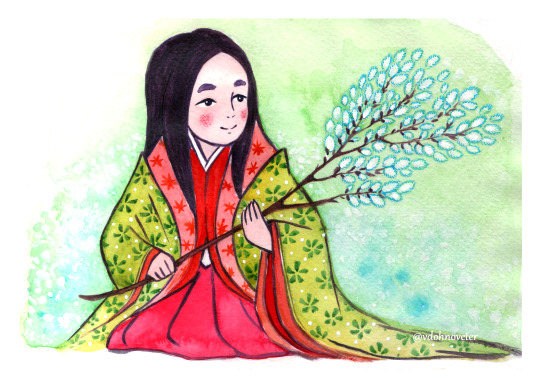
«Сказание о Принцессе Кагуя»
#ghibli#studio ghibli#ジブリ#студия гибли#studioghibli#исао такахата#takahata isao#isao takahata#高畑 勲#сказание о принцессе кагуя#かぐや姫の物語#The Tale of the Princess Kaguya
78 notes
·
View notes
Text
アルプスの少女ハイジ #9
雪をさけて木の下にやってきた鹿
ハイジが干草を持っていって食べさせる
0 notes
Text
スタジオジブリ全23作品のポスターとパンフレットを完全復刻! 「ジブリ Movie Collection」シリーズをTOHO animation STORE限定特典付きで11/1 より販売開始!
#GHIBLI#宮崎駿#Hayao Miyazaki#高畑勲#Isao Takahata#Japanimation#Anime#Movie#1980s#80s#1990s#90s#2000s#2010s#2020s
0 notes
Text
「君たちはどう生きるか」は、宮崎が初めて「自伝をやる」と取り組んだという。「描きたかったことは二つ」と鈴木は言う。「一つは、自分のことを描く。これまで少年を主人公にしなかったのは、少年のことはよく分かっちゃうから。でも、そのまま描くのはイヤ、といってウソもイヤ。女の子ならよく分かんないから、理想として描けたんですよ。それがふつふつと湧き上がって、自分のことを描きたくなった。もっとも主人公らしくない主人公ですよね」
「もう一つは高畑さん」。高畑は宮崎よりも6歳上、東映動画の先輩だった。「宮崎は東映動画で高畑に出会って、作品スタッフとしてより、組合運動の中で高畑を支えてたんですね。『太陽の王子 ホルスの大冒険』で下っ端だった宮崎を見いだして、描かせた。そのいきさつがあって、自分の今日があると。高畑との出会いから、何を教えられたかという映画になるはずだった。ほんとの自伝なんです」
ところが2018年に高畑が亡くなり、宮崎の絵コンテ作りが止まってしまう。「高畑さんにささげるという映画だったのに支えがなくなった。放心状態になって1年間描けなくなっちゃう。立て直すのは時間がかかって、それだけ大きい存在だった」
0 notes
Text
高畑勲『漫画映画の志』:メモ
高畑勲が、『やぶにらみの暴君』と『王と鳥』の解説と考察をした内容。その「照り返し」で、高畑勲自身が「どんなつもり」でアニメを作っているかが分かる本にもなっている。これが大きい。つまり、「難解」で「誤読」されがちな高畑アニメをどのように見ればいいのかのヒントがつかめるのだ。
その意味で最も「読み応え」があったのは「終章」。「終章」には『やぶにらみ〜』と『王と鳥』の解説や考察はなく、高畑勲の「アニメ美学」や「アニメ哲学」とでも呼ぶべきものが、割合、直接的に展開されているからだ。
その「終章」で絶賛されていたのが、ミシェル・オスロの『キリクと魔女』と『アズニールとアスニール』。両作とも未見。
0 notes
Photo
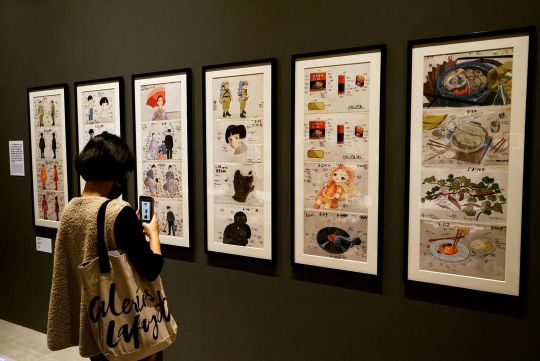
. 不忍再看第二遍的電影。 . . #螢火蟲之墓 #吉卜力 #高畑勲 #高畑勳展 #看展 #火垂るの墓 (at 台北流行音樂中心) https://www.instagram.com/p/CfWfHI7PpiB/?igshid=NGJjMDIxMWI=
0 notes
Text

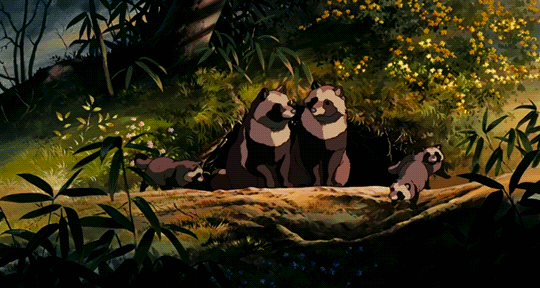
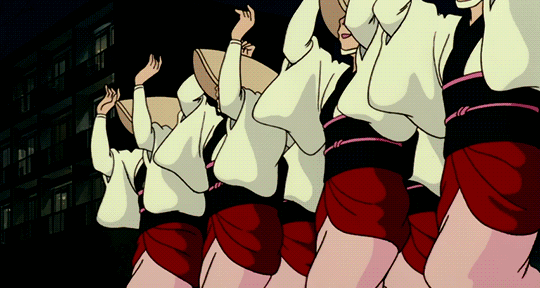

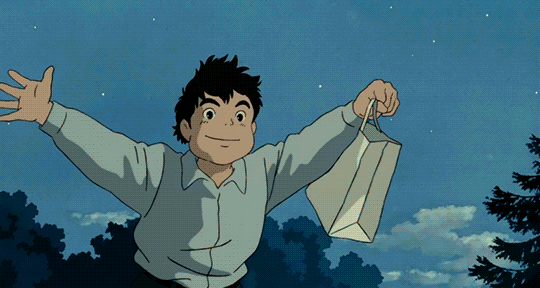
Ghiblicember Day #04 - 12 Days of Ghibli films
Pom Poko (1994)
Screenplay & Director: Isao Takahata (高畑 勲)
140 notes
·
View notes
Text
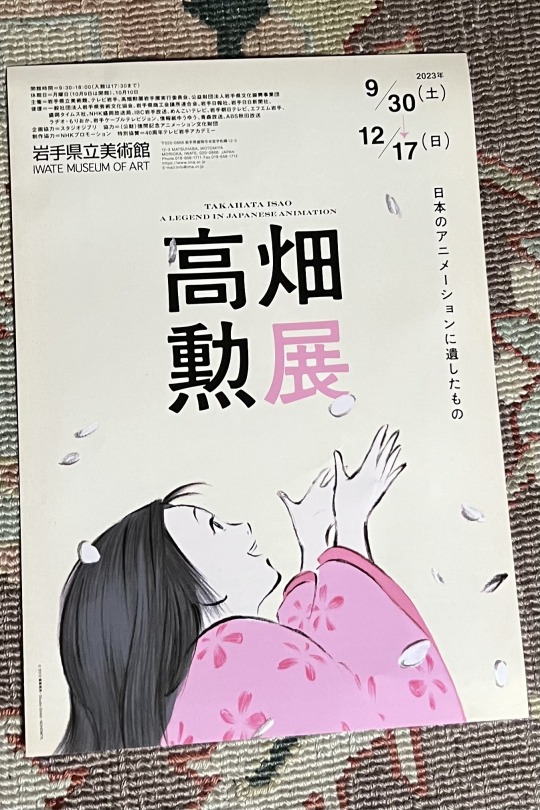
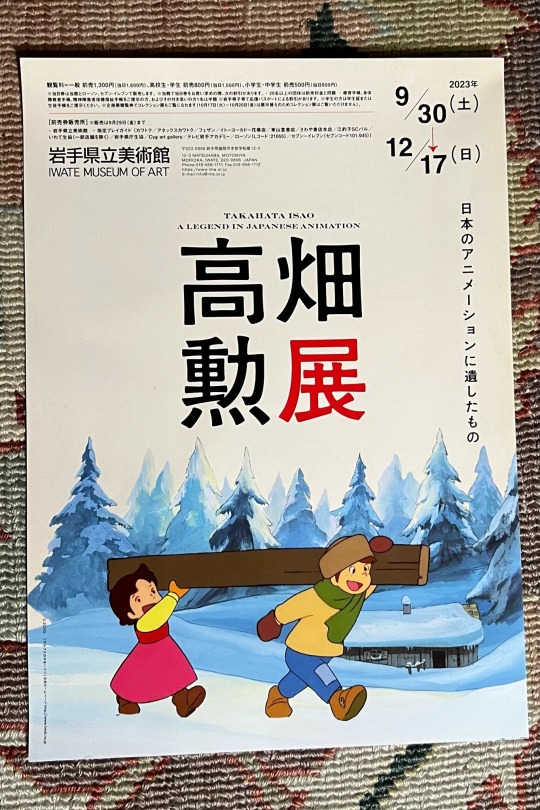
I saw this flyer for an Isao Takahata (高畑勲) exhibit and I got excited that both the front and back featured anime relevant to my Showa magical girl project — The Tale of the Princess Kaguya (かぐや姫の物語) and Heidi, Girl of the Alps (アルプスの少女ハイジ).
#showa era#magical girl#魔法少女#majokko#魔女っ子#昭和#retro shoujo#retro shojo#showa#かぐや姫#heidi#かぐ���姫の物語#princess kaguya#the tale of princess kaguya#アルプスの少女ハイジ#heidi girl of the alps
42 notes
·
View notes
Text
Japanese Movie Recommendations!
こんにちは皆さん!今日、特別な順序ではなく5本の好きな映画を紹介したいです。
Hi everyone! Today I’d like to introduce you to 5 of my favourite Japanese movies! My personal tastes lean more towards the horror and anime side of things, but I hope there are some here that you guys haven’t seen! Cinema can be a great avenue to delve deeper social commentaries about the country we’re interested in learning about, so I’ve tried to pick some recommendations with that in mind! :]
I’ve attempted to add all relevant content warnings, but there may be something I have missed so please take caution! I’d recommend having a look at what people say on DoesTheDogDie.com if you have specific concerns
Without further ado, let’s get started!
1. Confessions (告白) directed by Tetsuya Nakashima (中島哲也)

Confessions is a 2010 psychological thriller based off of the mystery novel of the same name. It follows the aftermath of the murder of a school teacher’s daughter by her pupils, who utilise Japan’s laws on age of criminal responsibility to “get away with it” and focuses on the differing perspectives of those involved. This film explores themes of revenge, familial values and expectations, and the normalization of violence in youth. This film is unmistakably heavy, but it is powerful.
This was introduced to me by my professor when I was doing a Japanese Film course in Uni, and it has stuck with me for YEARS. Not only is the story itself poignant, it’s brilliantly acted, beautifully shot, and has so many striking visuals with artistically composed scenes. As this was a fairly successful film, there are a fair few articles analysing its themes - if anyone is interested, I can try and dig up the resources we used when we studied this in class! :]
Content warnings: depictions and mentions of mental and physical abuse, violence towards children, violence committed by children, bullying mentions of animal death, attempted suicide, murder, mentions of chronic illness (AIDs and cancer in particular)
2. The Tale of the Princess Kaguya (かぐや姫の物語) directed by Isao Takahata (高畑 勲)
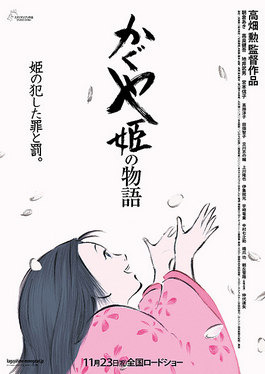
A retelling of famous folktale Taketori Monogatari (竹取物語) for modern Japanese audiences, The Tale of the Princess Kaguya brings new life to the classic story without sacrificing any of its heart. Takahata cited his own inability to connect to the original tale as inspiration for the retelling, aiming for something which the audience could connect to emotionally and really understand the titular princess.
The film deals with feminist concerns about the restrictions of womanhood (especially in the ambiguously Heian-era Japan), familial obligation, love, and the beauty of life. It’s a cultural adventure which I would recommend to anyone regardless of their familiarity with the tale it is adapting! Honestly, I’ve written essays about Taketori Monogatari and this film still managed to move me to tears with how beautifully and painstakingly rendered it is! I’d need a whole other post to detail just how much I appreciate the /art/ of this piece.
Content warnings: animal death, suggestion of sexual assault, arranged marriage, memory loss
3. Dark Water (仄暗い水の底から) directed by Hideo Nakata (中田 秀夫)

This 2002 horror movie is a sad ghost story! It follows the story of a single mother trying to get through her life while dealing with her divorce proceedings, new slightly-run-down apartment, and the paranormal occurrences haunting herself and her daughter. This movie deals with familial issues, parental sacrifice and confronting trauma.
Dark Water deals with aspects of Japanese horror which fans of Ringu (coincidentally, also directed by Nakata) may recognize, so I’d definitely recommend fans of Ringu and people wanting to explore the way that different cultures portray horror to give this one a shot. I found this one so fun to analyse recurring themes and imagery in Japanese horror, and I’m more than happy to encourage others to fall down this rabbit hole too!
Content warnings: missing children, death (including that of a child), threat of death, drowning, abandonment, divorce
4. The Girl Who Leapt Through Time (時をかける少女) directed by Makoto Shinkai (新海 誠)
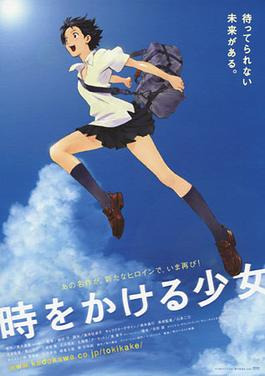
This 2006 sci-fi romance tells the story of a high-school girl who discovered that she has the ability to travel through time! Dealing with friendship, the pressures of growing up and romance, this movie integrates slice-of-life and coming of age themes into its sci-fi setting! Its your classic tale of fairly innocent time-travel shenanigans and trying to right some wrongs, and makes the the ultimate heartwarming story!
This one used to be pretty popular amongst anime fans a gooood few years back, but I haven’t seen people talk about it in a while and I wanted to mention it just in case it had fallen off the radar! With simple yet fluid character designs and beautiful scenery, this piece manages to portray grounded teenage characters and capture that warm summer feeling throughout.
Content warnings: threat of death, train accidents, minor violence and name calling
5. Tokyo Sonata (トウキョウソナタ) directed by Kiyoshi Kurosawa (黒沢 清)
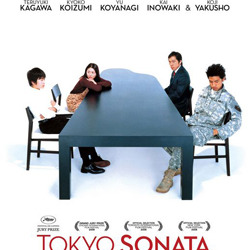
This 2008 drama follows the disintegration of a middle-class family after the patriarch loses his comfortable salaryman job unexpectedly. This film tackles issues faced by many modern families as the sense of traditionalism and societal normalcy becomes strained under the pressures of expectation, unemployment, and inability to communicate your authentic self to your family.
This film is an incredibly grounded drama, depicting real issues faced by so many families. Take a look at the date on this film, and you’ll realise how true-to-home this story of societal and economic uncertainty is for so many. Despite it all, what seems on the surface to be a depressing story of a family at their worst, actually displays a message of hope throughout. I find it to be a very realistic and poignant film.
Content warnings: unemployment, financial struggle, communication issues, war, military, abuse, domestic violence, crime, robbery, kidnapping, themes of suicide and depression, sexual assault, car accidents, police presence
Bonus! Gohatto (御法度) directed by Nagisa Ōshima (大島 渚)
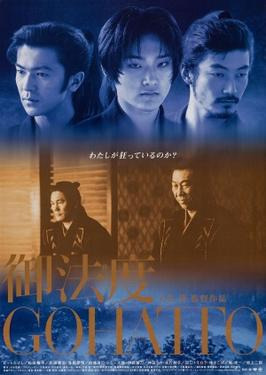
This one was recommended by my flatmate for this list, as a quick shoutout because “its very good” so I don’t personally have much to say about it - but I’m never going to complain about a recommendation for a gay samurai film. :]
それで、おすすめを���わります!
Thank you all for reading through this list! If you have any recommendations of your own, please feel free to add them on!
#leo speaks#japanese#japanese movie#japanese movies#langblr#japanese langblr#movies#film#japanese cinema#japanese study blog#japanese studyblr#film recommendations
50 notes
·
View notes
Quote
いちばん怖いのは、高畑勲が「そのうち清太を非難する人たちが現れる」と予言した通りになってる事だな。
[B! 映画] シン・ホネキング on Twitter: "「火垂るの墓」の清太に批判的な人が増えているらしい件、もうひとつ思い当たる要因があって、もしかして「物語」を異世界転生もの」の流儀で読んだり観る癖がついているのではないかな? https://t.co/lm8Yc8VfK9"
24 notes
·
View notes
Text
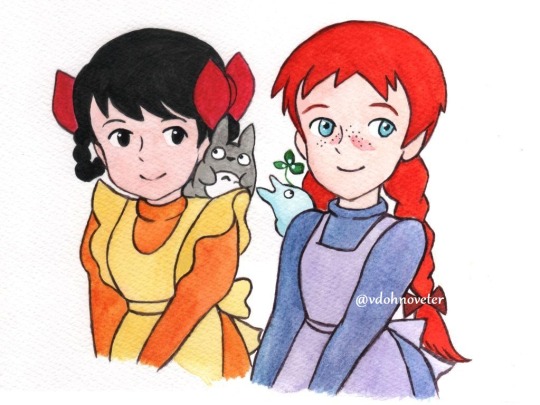
Диана & Энн + Тоторо
#ghibli#studio ghibli#ジブリ#студия гибли#studioghibli#миядзаки#хаяо миядзаки#miyazaki#totoro#となりのトトロ#宮崎 駿#hayao mizayaki#takahata isao#isao takahata#高畑 勲#akage no anne#赤毛のアン#anne of green gables#энн из зелёных мезонинов#энн из зелёных крыш
86 notes
·
View notes
Quote
ちなみに…野坂昭如の娘が、国語の試験に出た「火垂るの墓の作者の気持ち」という問題に、父親に聞いた通り「締め切りに追われて必死だった」と答えたら✖︎をつけられたという楽しいお話は全くの事実無根。いかにも父が言いそうなことではありますが。一部で都市伝説のような有名なネタとなっているみたいです。
高畑勲監督 | maolitta マオリッタ 〜野坂麻央の日々雑感〜 (via katoyuu)
6 notes
·
View notes
Text
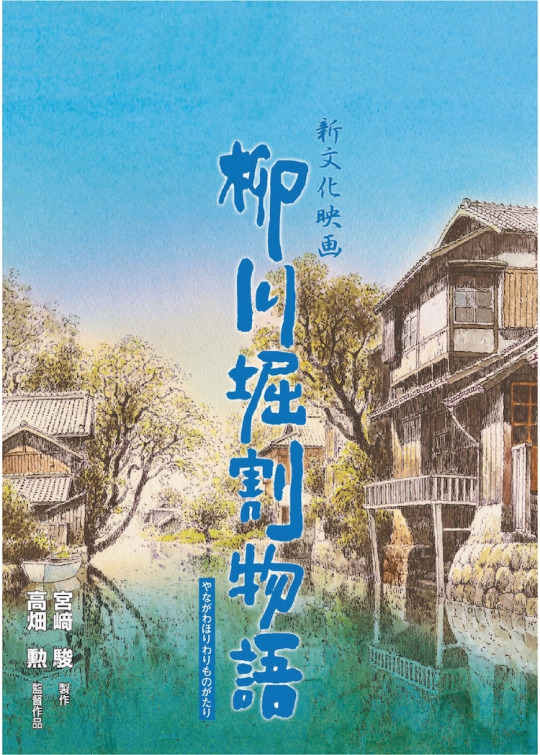
柳川掘割物語
1 note
·
View note

